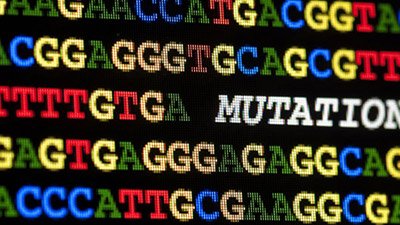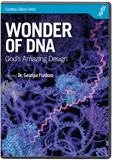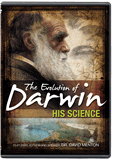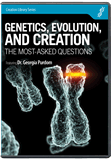Evolution is Just Mistakes
As we saw in Don’t Let the Bedbugs Evolve, a major fault line between creationists and evolutionists concerns the appearance of novel genetic information in nature. What does the latest research say about what’s supposed to be the driving force of evolution?
News Source
Perhaps it’s best if we begin by quoting the opening paragraph of the University of Arizona press release on the research:
Some individuals are better adapted to a given environment than others, making them more likely to survive and pass on their genes to future generations. But exactly how nature creates variation in the first place still poses somewhat of a puzzle to evolutionary biologists.
If new genetic information—which would be required to build working eyes where there are none, for example—does not occur in nature, then evolution is stuck in the water. Even if natural selection allows populations to “evolve” as the fittest propagate more effectively than others, what happens when only the fittest remain?
For evolutionists, the solution comes in the form of mutations: mistakes that occur in gene replication that introduce new, “mutant” variants of creatures. If a mutation confers a reproductive advantage, the mutant creature survives and propagates itself, eventually taking hold in the population. Or so the story goes.
The problem for evolutionists is that the only beneficial mutations ever observed by humans do not add new information to the genome; they merely reshuffle or, sometimes, delete genetic information. That may still lead to a mutant creature, but it’s quite the opposite of the changes Darwin had in mind. Rather than fish gaining weight-bearing limbs and lungs, commonly cited examples of “evolution” have cave fish losing their eyes. Obviously, such a process could go on forever and fish would never turn into philosophers; fish would continue to be fish, being at most an “ultra-simplified” fish.
University of Arizona biologists Joanna Masel and Etienne Rajon have taken a closer look at the process that results in mutations. Their research appears in the Proceedings of the National Academy of Sciences. They note that if mutations never happened, organisms would only have limited ways to respond to environmental changes. On the other hand, mutations pose dangers, and organisms that do not limit this danger will soon die out. But then again, limiting the dangers of mutations—through biological mechanisms that “proofread” replicated genes to eliminate errors—carries a cost.
Through the use of a mathematical model and accompanying computer simulation, Masel and Rajon find that the optimal biological behavior is something they call “cryptic variation.” In cryptic variation, mutations are not immediately repaired; instead, a process of natural selection (“pre-selection”) occurs within the cell, and mutated genes that are destructive fail to be copied further.
“Pre-selection puts that cryptic variation in a state of readiness," Masel explained. “One could think of [it] as natural selection going on behind the scenes, weeding out variations that are going to be catastrophic, and enriching others that are only slightly bad or even harmless. Whatever is left after this process of pre-selection has to be better.”
What enabled the regulation of mutations, encouraging only the best to propagate, before this system evolved?
The idea is certainly interesting, but it fails to address the creationist critique. First, consider the astounding complexity that already had to exist in the genome to enable such sophisticated proofreading processes (let alone every other crucial cellular process). What enabled the regulation of mutations, encouraging only the best to propagate, before this system evolved? Second, such an ideal regulatory mechanism doesn’t actually explain how complex, working mutations could be produced; this is presumably left up to the workings of chance, such that (the evolutionists presume) over millions of years novel, information-adding mutations do occur. But, third, even if that is a possibility, reasonable estimates of the rate of mutations and the likelihood of generating information-adding mutations may show that evolution would have had too little time to generate the complexity we see today. Further (fourth), no such information-adding mutations have been observed in nature.
It is also not clear what assumptions went into the scientists’ model, and how accurately or inaccurately those assumptions and the model reflect reality. Besides, even if such a scenario were theoretically and empirically plausible, does that mean God couldn’t have created supernaturally if He wanted to?
Further Reading
For More Information: Get Answers
Remember, if you see a news story that might merit some attention, let us know about it! (Note: if the story originates from the Associated Press, FOX News, MSNBC, the New York Times, or another major national media outlet, we will most likely have already heard about it.) And thanks to all of our readers who have submitted great news tips to us. If you didn’t catch all the latest News to Know, why not take a look to see what you’ve missed?
(Please note that links will take you directly to the source. Answers in Genesis is not responsible for content on the websites to which we refer. For more information, please see our Privacy Policy.)
Recommended Resources

Answers in Genesis is an apologetics ministry, dedicated to helping Christians defend their faith and proclaim the good news of Jesus Christ.
- Customer Service 800.778.3390
- © 2024 Answers in Genesis







